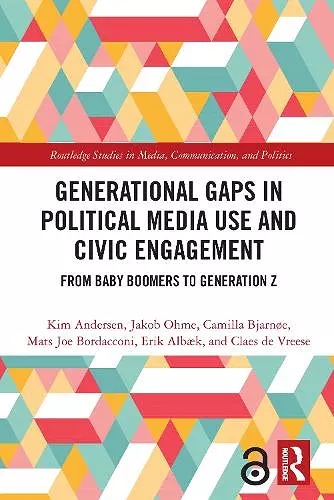Generational Gaps in Political Media Use and Civic Engagement
From Baby Boomers to Generation Z
Claes H De Vreese author Erik Albæk author Kim Andersen author Jakob Ohme author Camilla Bjarnøe author Mats Joe Bordacconi author
Format:Paperback
Publisher:Taylor & Francis Ltd
Published:1st Aug '22
Currently unavailable, and unfortunately no date known when it will be back
This paperback is available in another edition too:
- Hardback£145.00(9780367629328)

This book investigates news use patterns among five different generations in a time where digital media create a multi-choice media environment.
The book introduces the EPIG Model (Engagement-Participation-Information-Generation) to study how different generational cohorts’ exposure to political information is related to their political engagement and participation. The authors build on a multi-method framework to determine direct and indirect media effects across generations. The unique dataset allows for comparison of effects between legacy and social media use and helps to disentangle the influence on citizens’ political involvement in nonelection as well as during political campaign times. Bringing the newly of-age Generation Z into the picture, the book presents an in-depth understanding of how a changing media environment presents different challenges and opportunities for political involvement of this, as well as older generations.
Bringing the conversation around political engagement and the media up to date for the new generation, this book will be of key importance to scholars and students in the areas of media studies, communication studies, technology, political science and political communication.
This impressive book introduces a new model for studying media use and political participation. The authors introduce an original research design that combines generational analysis of media preferences with a compelling framework for mapping a broad spectrum of political participation. The resulting analyses shows how different generations of citizens are defined by their media habits, and how those communication preferences offer different pathways into politics.
Lance Bennett, Professor of Political Science and Ruddick C. Lawrence Professor of Communication, Emeritus, University of Washington, Seattle, USA
Rich in data and full of big ideas, Generational Gaps in Political Information Use and Civic Engagement tells the story of remarkable differences in patterns of media use and political engagement across five generations. The authors paint a largely hopeful portrait of the continued importance of news use in democracy, while offering warnings to us all of the potential dangers posed by our increasingly fragmented, personalized media environment. The book is a must for anyone who cares about safeguarding the political voice of emerging generations.
Kjerstin Thorson, Associate Professor, Michigan State University
With the changing media landscape creating new patterns of information consumption and opportunities for a great number of actors to express themselves and reach others in ways that were previously impossible, understanding the effects of exposure to political information on political participation is critical for assessing the health of our democracy. Theoretically innovative and conceptually rich, Generational Gaps in Political Information Use and Civic Engagement, brings together three different types of data collection to explore the interplay between information consumption, participation and engagement by the young and the elderly. Providing new insights about how a variety of types of exposure experienced by five generations affect different types of input to the political system, Andersen and colleagues’ book adds important new empirical evidence for understanding participation and active citizenship in a changing political information environment.
Professor of Media and Communication, University of Bremen
ISBN: 9780367629342
Dimensions: unknown
Weight: 360g
202 pages